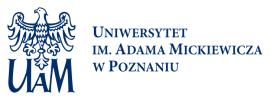
Basic information
- Study programme
- Global Communication
- Speciality
- -
- Organizational unit
- Faculty of Modern Languages and Literatures
- Study level
- First-cycle programme
- Study form
- Full-time
- Education profile
- General academic
- Didactic cycle
- 2023/24
- Subject code
- 09GLCS.120KP.02942.23
- Lecture languages
- English
- Course type
- Obligatory
- Block
- Basic major subjects
|
Period
Semester 6
|
Activities and hours
|
Number of ECTS points
3
|
Goals
| Code | Goal |
| C1 | The course’s aim is to apply public communication principles to the specific needs and goals of advocacy and political campaigns. Coursework explores major elements such as multimodal nature of political communication |
Subject learning outcomes
| Code | Outcomes in terms of | Learning outcomes | Examination methods |
| Knowledge – Student: | |||
| W1 | defines multimodal nature of political communication | GLC_K1_W05, GLC_K1_W08 | Written colloquium, Oral colloquium, Multimedia presentation |
| W2 | defines areas of political communication | GLC_K1_W05, GLC_K1_W08 | Written colloquium, Oral colloquium, Multimedia presentation |
| W3 | knows scientific works in the field of political communication | GLC_K1_W05, GLC_K1_W08 | Written colloquium, Oral colloquium, Multimedia presentation |
| Skills – Student: | |||
| U1 | presents and compares terminology regarding principles, models and processes of political communication | GLC_K1_U01, GLC_K1_U02, GLC_K1_U07 | Written colloquium, Oral colloquium, Multimedia presentation |
| U2 | explains the place of research on political communication within linguistics and communication | GLC_K1_U01, GLC_K1_U02, GLC_K1_U07 | Written colloquium, Oral colloquium, Multimedia presentation |
| U3 | reads and understands scientific works in the field of political communication | GLC_K1_U01, GLC_K1_U02, GLC_K1_U07 | Written colloquium, Oral colloquium, Multimedia presentation |
| Social competences – Student: | |||
| K1 | is open to learning communicative skills effectively through multiple modes across culturally and communicative diverse environments | GLC_K1_K01, GLC_K1_K02 | Written colloquium, Oral colloquium, Multimedia presentation |
| K2 | shows awareness of the role of individuals, institutions, and cultural values in intercultural communication competence. | GLC_K1_K01, GLC_K1_K02 | Written colloquium, Oral colloquium, Multimedia presentation |
Study content
| No. | Course content | Subject learning outcomes | Activities |
| 1. |
Political communication: origin of the concept |
W1, W2, W3, U1, U2, U3, K1, K2 | Lecture |
| 2. |
Political communication: defining the concept |
W1, W2, W3, U1, U2, U3, K1, K2 | Lecture |
| 3. |
Participants of a political communication process |
W1, W2, W3, U1, U2, U3, K1, K2 | Lecture |
| 4. |
Multimodal nature of political communication: linguistic resources |
W1, W2, W3, U1, U2, U3, K1, K2 | Lecture |
| 5. |
Multimodal nature of political communication: nonlinguistic resources |
W1, W2, W3, U1, U2, U3, K1, K2 | Lecture |
| 6. |
Areas of political communication: rhetoric |
W1, W2, W3, U1, U2, U3, K1, K2 | Lecture |
| 7. |
Areas of political communication: propaganda |
W1, W2, W3, U1, U2, U3, K1, K2 | Lecture |
| 8. |
Areas of political communication: persuasion |
W1, W2, W3, U1, U2, U3, K1, K2 | Lecture |
| 9. |
Areas of political communication: public relations |
W1, W2, W3, U1, U2, U3, K1, K2 | Lecture |
| 10. |
Areas of political communication: political marketing |
W1, W2, W3, U1, U2, U3, K1, K2 | Lecture |
Additional information
| Activities | Teaching and learning methods and activities |
|---|---|
| Lecture | Lecture with a multimedia presentation of selected issues, Discussion, Demonstration and observation, Audio and/or video demonstrations |
| Activities | Credit conditions |
|---|---|
| Lecture |
- knowledge of the recommended literature on the subject,
Grading scale: |
Literature
Obligatory- Kenski, K and K.H. Jamieson (eds). 2014. The Oxford Handbook of Political Communication. Oxford Academic.
- Semetko, H. A., and M. Scammell (eds). The SAGE Handbook of Political Communication. Sage Publishing
Calculation of ECTS points
| Activities | Activity hours* | |
| Lecture | 30 | |
| Preparation for classes | 20 | |
| Preparation of a multimedia presentation | 25 | |
| Preparation for the assessment | 15 | |
| Student workload |
Hours
90
|
|
| Number of ECTS points |
ECTS
3
|
|
* academic hour = 45 minutes